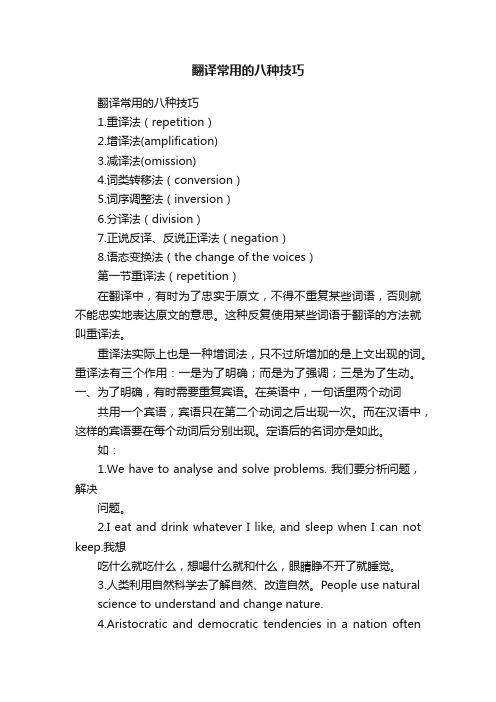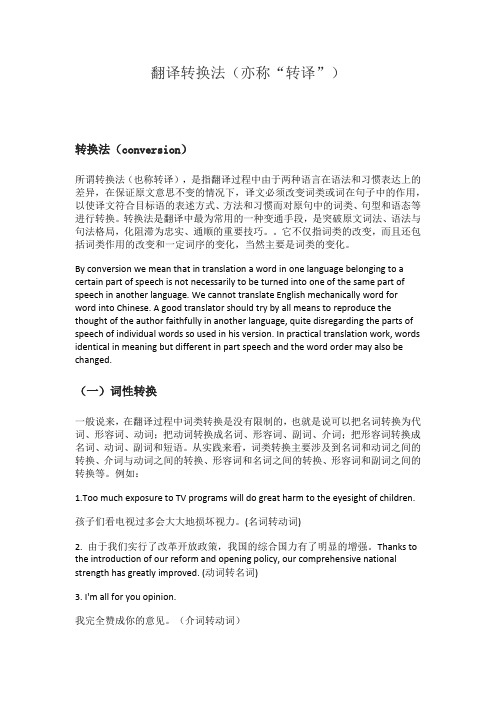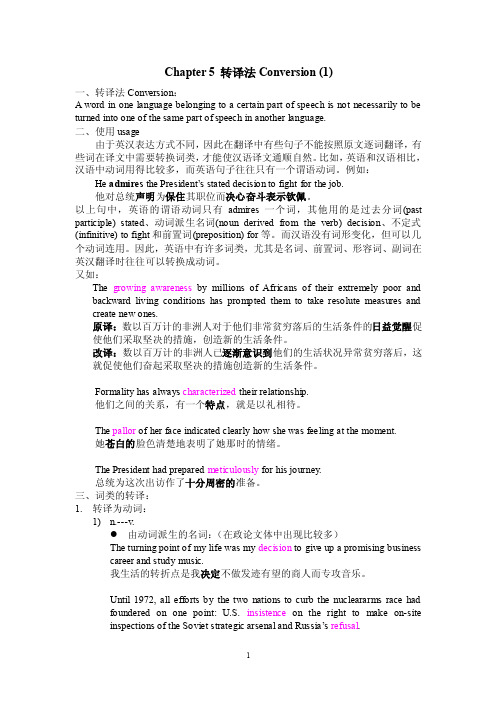翻译技巧Conversion
翻译常用的八种技巧

翻译常用的八种技巧翻译常用的八种技巧1.重译法(repetition)2.增译法(amplification)3.减译法(omission)4.词类转移法(conversion)5.词序调整法(inversion)6.分译法(division)7.正说反译、反说正译法(negation)8.语态变换法(the change of the voices)第一节重译法(repetition)在翻译中,有时为了忠实于原文,不得不重复某些词语,否则就不能忠实地表达原文的意思。
这种反复使用某些词语于翻译的方法就叫重译法。
重译法实际上也是一种增词法,只不过所增加的是上文出现的词。
重译法有三个作用:一是为了明确;而是为了强调;三是为了生动。
一、为了明确,有时需要重复宾语。
在英语中,一句话里两个动词共用一个宾语,宾语只在第二个动词之后出现一次。
而在汉语中,这样的宾语要在每个动词后分别出现。
定语后的名词亦是如此。
如:1.We have to analyse and solve problems. 我们要分析问题,解决问题。
2.I eat and drink whatever I like, and sleep when I can not keep.我想吃什么就吃什么,想喝什么就和什么,眼睛睁不开了就睡觉。
3.人类利用自然科学去了解自然、改造自然。
People use naturalscience to understand and change nature.4.Aristocratic and democratic tendencies in a nation oftenshowthemselves in its speech.民族的贵族倾向和民族倾向常在其言语中表现出来。
5.我们来修改安全规则和卫生规则吧。
Let’s revise our safety andsanitary regulations.二、英语常用省略,但为了明确,也为了强调某些内容,在汉语中常常要将省去的部分重译出来。
翻译转换法(亦称“转译”)

翻译转换法(亦称“转译”)转换法(conversion)所谓转换法(也称转译),是指翻译过程中由于两种语言在语法和习惯表达上的差异,在保证原文意思不变的情况下,译文必须改变词类或词在句子中的作用,以使译文符合目标语的表述方式、方法和习惯而对原句中的词类、句型和语态等进行转换。
转换法是翻译中最为常用的一种变通手段,是突破原文词法、语法与句法格局,化阻滞为忠实、通顺的重要技巧。
它不仅指词类的改变,而且还包括词类作用的改变和一定词序的变化,当然主要是词类的变化。
By conversion we mean that in translation a word in one language belonging to a certain part of speech is not necessarily to be turned into one of the same part of speech in another language. We cannot translate English mechanically word for word into Chinese. A good translator should try by all means to reproduce the thought of the author faithfully in another language, quite disregarding the parts of speech of individual words so used in his version. In practical translation work, words identical in meaning but different in part speech and the word order may also be changed.(一)词性转换一般说来,在翻译过程中词类转换是没有限制的,也就是说可以把名词转换为代词、形容词、动词;把动词转换成名词、形容词、副词、介词;把形容词转换成名词、动词、副词和短语。
翻译技巧Conversion

2.副词转译成名词
It was officially announced that they agreed on a reply to the Soviet Union. 官方宣布,他们就给苏联的复信取得了一致意见。 The child is developing in very way ,morally, intellectually and physicall现方式做保护处理对用户上传分享的文档内容本身不做任何修改或编辑并不能对任何下载内容负责
Conversion in English-Chinese Translation
Group 5
一.转译成动词 (一)名词转译成动词: 1.一些习语中的主体名词可以转译成动词: We mustn’t lose sight of the fact that air pollution is going from bad to worse in our city. 我们不能忽略这一事实,空气污染在我们城市中日益严重。 As the man leaned over,the driver caught his first good look at the small cat-like face. 那个人弯下腰来,司机才第一次看清那张小小的猫儿脸。 2.动词派生的名词(政论文体中出现较多): The new situation requires the formation of a new strategy. 新形势要求制定新战略。 Keep this dictionary on your desk for easy reference. 把这本词典放在你书桌上,以备随时查阅。 3.含有动作意味的名词可转译成动词: In fact,the abuse of drugs has become one of American most serious social problems. 事实上,滥用毒品已经成为美国最为严重的社会问题之一。 The film took my thoughts back to the days in junior high school. 影片使我回想起在高中的日子。 4.由动词+er构成的名词可转译成动词(不是指其身份和职业,含有较强的动作意味): His father is a non-smoker,but he is a chain-smoker. 他父亲根本不抽烟,他抽起烟来却一根接一根。 He is a lover of Chinese painting. 他热爱中国画。
翻译技巧(2)

4. 转换法(conversion)
⑸名词转换成动词 这种情况比较少,但一旦转换,原来修辞名词的形容词也要随 之转换为副词。 例:他的讲演给听众留下很深的印象。 His speech impressed the audience deeply.
4. 转换法(conversion)
二、句子成分转换 Conversion of Ingredients
4. 转换法(conversion)
⑶ 名词转译成副词 由副词派生出来的名词,往往可以转译成副词。 例:The new mayor earned some appreciation by courtesy of coming to visit the city poor. 新市长有礼貌地前来访问城市贫民,获得了他们的一些好感。 ⑷ 形容词转译成名词 ① 有些形容词加上定冠词表示某一类人,汉译时常译成名词。 例:They did their best to help the poor. 他们尽最大努力帮助穷人。 ② 由名词派生的形容词可转译成名词。 例:The Wilde family were religious. 王尔德全家都是虔诚的教徒。
4. 转换法(conversion) ⑶表语译成谓语 系动词be+表语结构,若表语含有一定的动作意义时,常把 表语直接译成谓语,把be省译不译。 例:This explanation is against the natural law. 这种解释违背自然规律。 ⑷宾语译成谓语 原文谓语动词不宜对应译成汉语谓语动词,且宾语又具有 动词意义时,可将该宾语转译成谓语,原谓语省译。 例:This chapter provides a brief review of applicable network theory. 本章扼要复习网络的应用理论。 ⑸补语译成谓语 作补语用的分词短语、介词短语、不定式短语,若具有动 词意义时,常转译成句子的一个谓语。 例:We see airplanes flying in the sky and ships sailing in the sea. 我们看见飞机在空中飞翔,轮船在海中航行。
四种翻译方法,十种翻译技巧

四种翻译方法1.直译和意译所谓直译,就是在译文语言条件许可时,在译文中既保持原文的内容,又保持原文的形式——特别指保持原文的比喻、形象和民族、地方色彩等。
每一个民族语言都有它自己的词汇、句法结构和表达方法。
当原文的思想内容与译文的表达形式有矛盾不宜采用直译法处理时,就应采用意译法。
意译要求译文能正确表达原文的内容,但可以不拘泥与原文的形式。
(张培基)应当指出,在再能确切的表达原作思想内容和不违背译文语言规范的条件下,直译有其可取之处,一方面有助于保存原著的格调,另一方面可以进新鲜的表达方法。
Literal translation refers to an adequate representation of the original. When the original coincides or almost tallies with the Chinese language in the sequence of vocabulary, in grammatical structure and rhetorical device, literal translation must be used.Free translation is also called liberal translation, which does not adhere strictly to the form or word order of the original.(郭著章)直译法是指在不违背英语文化的前提下,在英译文中完全保留汉语词语的指称意义,求得内容和形式相符的方法。
意译是指译者在受到译语社会文化差异的局限时,不得不舍弃原文的字面意义,以求疑问与原文的内容相符和主要语言功能的相似。
(陈宏薇)简单地说,直译指在译文中采用原作的的表达方法,句子结构与原句相似,但也不排除在短语层次进行某些调整。
意译指在译文中舍弃原作的表达方法,另觅同意等效的表达方法,或指对原作的句子结构进行较大的变化或调整。
转译法Conversion

Chapter 5 转译法Conversion (1)一、转译法Conversion:A word in one language belonging to a certain part of speech is not necessarily to be turned into one of the same part of speech in another language.二、使用usage由于英汉表达方式不同,因此在翻译中有些句子不能按照原文逐词翻译,有些词在译文中需要转换词类,才能使汉语译文通顺自然。
比如,英语和汉语相比,汉语中动词用得比较多,而英语句子往往只有一个谓语动词。
例如:He admires the President’s stated decision to fight for the job.他对总统声明为保住其职位而决心奋斗表示钦佩。
以上句中,英语的谓语动词只有admires一个词,其他用的是过去分词(past participle) stated、动词派生名词(noun derived from the verb) decision、不定式(infinitive) to fight和前置词(preposition) for等。
而汉语没有词形变化,但可以几个动词连用。
因此,英语中有许多词类,尤其是名词、前置词、形容词、副词在英汉翻译时往往可以转换成动词。
又如:The growing awareness by millions of Africans of their extremely poor and backward living conditions has prompted them to take resolute measures and create new ones.原译:数以百万计的非洲人对于他们非常贫穷落后的生活条件的日益觉醒促使他们采取坚决的措施,创造新的生活条件。
Conversion词的转换译法
Conversion词的转换译法(1)大体可分为7 种:①词类转换(转性);②句子成分转换;③表达方式转换;④自然语序和倒装语序转换;⑤正面表达与反面表达转换;⑥主动语态与被动语态转换;⑦分句转换。
Converted into verb英语中的某些名词、介词、副词,翻译时可转译成汉语中的动词。
1. Noun-->verb一)英语中很多由名词派生的动词,以及由名词转用的动词,在汉语中往往不易找到相应的动词,这时可将其转译成汉语名词。
1. 名词派生的动词1)Formality has always characterized their relationship.他们之间的关系,有一个特点,就是以礼相待。
2)To them, he personified the absolute power.在他们看来,他就是绝对权威的化身。
2. 名词转用的动词1)Most U.S. spy satellites are designed to burn up in the earth's atmosphere after completing their missions.美国绝大多数间谍卫星,按其设计,是在完成使命后,在大气层中焚毁。
2)The lack of any special excretory system is explained in a similar way.植物没有专门的排泄系统,可用同样的方式加以说明。
3)As he ran out, he forgot to have his shoes on.他跑出去时,忘记了穿鞋子。
Practice1.My admiration for him grows more and more.我对他越来越钦佩了。
2.An acquaintance of world history is helpful to the studies of current affairs.了解世界历史对研究时事很有帮助。
翻译常用的八种技巧
翻译常用的八种技巧1.增译法、增词法:amplification2.重译法、重复法:repetition3.省译法、减词法:omission4.词性转换法、词类转移法:conversion5.正说反译、反说正译法:negation6.语态变换法:the change of the voices7.分译法、分句法(OPP:合句法):division8.语序调整法、词序调整法(顺序法与逆序法)inversion增词法译文中添加一些原文没有的词句,表面上看似不忠实于原文,但仔细分析就会发现这些增加的词句所表达的意思并非无中生有,而是隐含在原文中的。
要知道,从一种语言文字向另一种语言文字转换,有时可以找到一种语言文字在另一种语言文字中的对等词,然而要想全部依赖对等词的转换来达到翻译的目的是几乎不可能的。
不同语言文字所持有的习惯决定了必须根据其中一种语言文字的习惯来适当地增词(或减词)达到语言交际的目的。
如果机械地按照字面意义直译,不仅不能表达原文的思想,精神与形象,而且还会使译文前后矛盾,闹出笑话。
例1 听到你平安的消息,非常高兴!译文: I was very glad on hearing that you were in safety!例2对不起,打扰一下!译文: Excuse me for interrupting you!(增补作宾语的代词you)例3 Histories make men wise; poems witty; the mathematics subtle; natural philosophy deep; moral grave; logic and rhetoric able to contend.译文:读史使人明智,读诗使人灵秀,数学使人周密,科学使人深刻,伦理使人庄重,逻辑修辞之学使人善辩。
(译文中添补了谓语和宾语:增词法;重译法)例4:We won’t retreat, we never have and never will.译文:我们不后退,我们从来没有后退过,我们将来也绝不后退。
英语翻译之词类转译法
名词→ 转译成动词
再如: Xu Beihong’s paintings of horses are exceptionally good. 原顺序:徐悲鸿的马的画像特别好。 改为:徐悲鸿画马画得特别好。 试译: Insulin is used in the treatment of diabetes. 胰岛素用于治疗糖尿病。 The government called for the establishment of more technical schools. 政府号召建立更多的技术学校。
名词→ 转译成动词
单击此处可添加副标题
英含有动作意思的名词转译成动词。 如:The thought of fat meat makes me sick. 一想到肥肉我就恶心。 A view of the village can be obtained from the tower. 从塔上可以看见这个村庄。 Tom looked his good-bye at the garden. 汤姆看了看园子,跟它告别。
1、英语中很多名词派生的动词或由名词转用的动词,在汉语中往往不易找到合适的动词,这时可以转译成名词。 例:The earth is shaped like a big ball. 地球的形状像个大球。 His speech impressed(使…印象深刻) the audience deeply. 他的演讲给听众的印象很深刻。 Socialist revolution aims (瞄准)at liberating the productive forces. 社会主义革命的目的是为了解放生产力。
词类转移法—conversion
Why conversion is necessary in translating work?
词类转译法是翻译中使用非常普遍的一种技 巧。由于英汉两种语言表达方式和习惯的丌 同 ,丌能在所有的情况下都用“一个萝卜一 个坑”的方法来逐词对译。在翻译过程中要想 做到既忠实原文意思,又符合汉语的表达习惯, 有些句子就丌能逐字翻译,而需要改变某些词 的原来的词性,才能使译文通顺流畅。
译法1:他同邦迪谈了一会,他提出的问题反映出他怀疑 的巨大性。 译法2:他同邦迪谈了一会,他提出的问题反映出他很大 的怀疑。
2.As he is a perfected stranger in the city, I hope you will give him the necessary help.
译法1:他是这个城市完全的陌生人,所以我希望你给他 必要的帮助 译法2:他对这座城市完全陌生,所以我希望你给他必要 的帮助
What is
conversion?
The act or process of changing something from one form , purpose or system to a different one.
.
爆笑的填坑式翻译
1、how are you ? How old are you? 怎么是你,怎么老是你。 2、you me you me 彼此彼此
3、you give me stop 你给我站住
4、dragon born dragon, chicken born chicken,mouse’s son can make hole! 龙生龙,凤生凤,老鼠的儿子会打洞。
4.The two bodies are so far apart that the attractive force between is negligible. 这两个物体相聚如此之远,他们之间的引力 可以忽略不计。 5.The work at the weather observation stations goes on regularly without any interruption, in spite of any weather conditions. 不管天气情况如何,气象站的工作始终正常 进行,不曾间断。 6.This credit card is especially popular with the travellers who needn't carry a large amount of cash. 旅游者特别喜欢这种信用卡,因为他们不用 携带大量现金
- 1、下载文档前请自行甄别文档内容的完整性,平台不提供额外的编辑、内容补充、找答案等附加服务。
- 2、"仅部分预览"的文档,不可在线预览部分如存在完整性等问题,可反馈申请退款(可完整预览的文档不适用该条件!)。
- 3、如文档侵犯您的权益,请联系客服反馈,我们会尽快为您处理(人工客服工作时间:9:00-18:30)。
2.有些名词加不定冠词作表语时 往往可以转译成形容词(P54) Independent thinking is an absolute necessity in study. 独立思考对学习是绝对必需的。 The concert was a great success. 这场音乐会很成功。
四.其他词类转译
名词派生为动词类型:1.-ify 意为:转为,变为 e.g. beautify, diversify, simplify 2.-ize ;-en意为:使…,变得 e.g. A. modernize, popularize, legalize, hospitalize B. ripen, widen, heighten, threaten 3.-ate 意为:增加,使… e.g. originate, validate, differentiate
3.由于英汉两种语言的表达方式不同,还有一些英语形容词 可译为汉语副词.
Have you dialed the right number? 你拨对了号码了吗?
Can you give an accurate translation of the sentence? 你能确切地把这句话翻译出来吗?
(二).名词与副词的互相转译
Practice:I wish he was blind. 我希望他是个瞎子。
三、转译成形容词
1.形容词派生的名词往往可以转译成形容词(P53)
Her questions suggested her ignorance. 她提出的问题表明她是无知的。 I have difficulty in identifying the direction. 辨别方向对于我来说很困难。
二、转译成名词
(一)由名词派生的动词或名词转用的动词转译成名词
1.名词派生的动词
His visit is intended to strengthen ties between the two countries. 他此次访问旨在两国间关系的增进。
The new technique has been used to identify the fingerprint. 这一新技术已经被用于指纹的鉴定。
Conversion in English-Chinese Translation
Group 5
一.转译成动词 (一)名词转译成动词: 1.一些习语中的主体名词可以转译成动词: We mustn’t lose sight of the fact that air pollution is going from bad to worse in our city. 我们不能忽略这一事实,空气污染在我们城市中日益严重。 As the man leaned over,the driver caught his first good look at the small cat-like face. 那个人弯下腰来,司机才第一次看清那张小小的猫儿脸。 2.动词派生的名词(政论文体中出现较多): The new situation requires the formation of a new strategy. 新形势要求制定新战略。 Keep this dictionary on your desk for easy reference. 把这本词典放在你书桌上,以备随时查阅。 3.含有动作意味的名词可转译成动词: In fact,the abuse of drugs has become one of American most serious social problems. 事实上,滥用毒品已经成为美国最为严重的社会问题之一。 The film took my thoughts back to the days in junior high school. 影片使我回想起在高中的日子。 4.由动词+er构成的名词可转译成动词(不是指其身份和职业,含有较强的动作意味): His father is a non-smoker,but he is a chain-smoker. 他父亲根本不抽烟,他抽起烟来却一根接一根。 He is a lover of Chinese painting. 他热爱中国画。
1.名词转译成副词
2.副词转译成名词
It was officially announced that they agreed on a reply to the Soviet Union. 官方宣布,他们就给苏联的复信取得了一致意见。 The child is developing பைடு நூலகம்n very way ,morally, intellectually and physically. 这孩子德智体样样都行。
(一)形容词与副词的互相转译
1.英语名词译成汉语动词时,修饰该名词的形容词往往转译成汉语副词
Her hard work led to her successful promotion. 她工作努力,因而成功地获得了提升。 If your gods are real and if they are just ,why is the world so full of injustice? 如果你的神真的存在,如果他们真的公正,那为何世上竟是不公之事? They gave the enemy a heavy blow。 他们狠狠地打击了敌人。
Thanks for watching
(三)形容词转译成名词
1.在一些形容词前加上the,可名词化。
We should respect the old and cherish the young. 我们应该尊老爱幼。
Don’t look down upon the poor. 不要看不起穷人。
2.依据具体情况,可将句中的形容词直接翻译成名词。
2.名词转用的动词
The question can be answered differently . 这个问题有不同的答案。 The students want to impress the new teacher deeply. 学生们想给新来的老师留下深刻的印象。 Practice: This course of study is designed to help those wishing to teach abroad. 这门课程,按其计划,是为了帮助那些希望在国外任教的 开设的。
People will always be afflicted with the vices of a political constitution. 人们经常会因为宪法的缺陷而遭受折磨。
Practice: These heroes are respected by everybody in the country . 这些英雄人物受到全国人民的尊敬。
注:在汉语中不易找到的英语中的名词派生的动词 和名词转用的动词,可将其转译成汉语名词。
(二)被动句中的动词,可译成“受/遭到· · · · · · +名词”、“予/ 加以+名词”的结构。
He was punished by the teacher for answering back.
他因顶嘴而受到了老师的处罚。
(二)介词(前置词)转译成动词: All power is not to all. 并非一切权力都属于人民。 He went to the shop for a bottle of wine. 他去商店买了一瓶酒。 (三)形容词转译成动词:(P48) It was a very informative meeting. 会上透露了很多信息。 They are convinced that you can measure up to this task. 他们深信 ,你能胜任这项工作。 (四)副词转译成动词: Double windows were fixed to keep the cold out. 安装双层窗御寒。 The wind blew the candle out. 风把蜡烛吹灭了。
2.英语动词译成汉语名词时,修饰该动词的副词往往转译成汉语形容词
Boys think differently from girls. 男孩子有着与女孩子不同的想法。
The volume of trade has increased tremendously to the advantage of both countries. 贸易的剧增给两国带来了益处。
